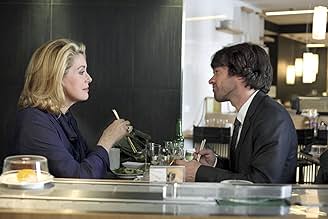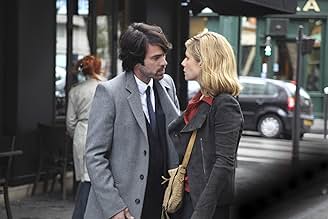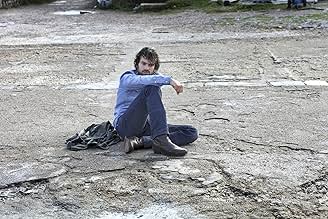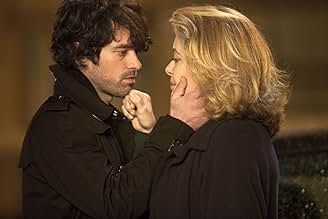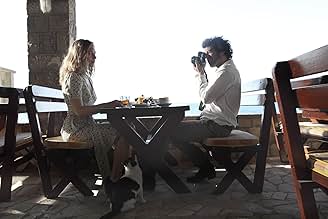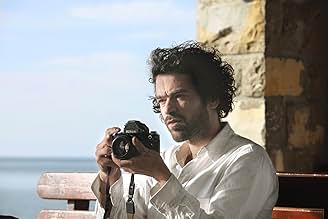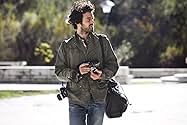IMDb-BEWERTUNG
6,6/10
3823
IHRE BEWERTUNG
Füge eine Handlung in deiner Sprache hinzuA successful Paris lawyer is forced to re-invent his life after he makes a fatal mistake.A successful Paris lawyer is forced to re-invent his life after he makes a fatal mistake.A successful Paris lawyer is forced to re-invent his life after he makes a fatal mistake.
- Auszeichnungen
- 3 Nominierungen insgesamt
Rachel Desmarest
- Fiona Exben
- (as Rachel Berger)
Esteban Carvajal-Alegria
- Valéry Grey
- (as Esteban Carvajal Alegria)
Empfohlene Bewertungen
The failure of a professional photographer to use the latest equipment is a good metaphor for this movie, whose English title makes no sense. It seems like it was shot from the original script submission before any grownups had a chance to edit the story. Terrific performances by all the actors, but a story line so sloppy that I re-animated my disbelief about half-way through. For me the most enjoyable aspect was the glimpse to life in various venues around (and near) Europe. I would love to have seen this in the hands of Alfred Hitchcock. He would have lent credibility to the desperation, which I felt was contrived and forced on me. I'll bet they ran out of money while filming and couldn't afford the ending they'd originally planned.
The Big Picture (2010)
Terrific vibes here, and a euphoric basic idea of a man getting out of a troubled situation and going for broke, for happiness. Literally, and spiritually.
First there is the set-up: a happy, charming, positive Paul Exben (played by the cheerful French actor Romain Duris). He's got an unhappy, negative wife and a kid who loves him and an infant who doesn't know what he wants (except to cry a lot). He's a photographer in the new manner, using high tech computers and high end printers. He loves being who he is, and is very successful financially.
But the wife is bitter and unyielding. Things are going to go wrong and they do. Exactly how (involving another photographer, a man who is very old school with a darkroom and enlarger) is partly what the movie is about, and the surprise is one of its peaks. Then the movie takes some amazing turns.
I say amazing but really there is a lot of incredulity built in. Would Paul Exben really go so far? Wasn't there a simpler solution (many of them)? If the end goal really was to "start over" in a manner of speaking, wouldn't there be ways of doing that and not sabotaging everything else? Maybe not, but then we should have been set up better for all the implications.
The movie's original title is "L'homme Qui Voulait Vivre Sa Vie," or "The Man Who Wanted to Live His Life." That's sooooo much better and more compelling. And that's what the movie is about. But the English title reminds us that photography, and this photographer, are central to it all, and I'm a photographer. I've been that old school type (by necessity) for decades and still have an enlarger (and a university darkroom) at my fingertips. But I have also moved almost completely into new school photography with inkjet printing and such.
I have to say, this movie made me want to get back in the darkroom. Not that there are scenes that romanticize that. More that there are lots of flaws and mistakes in pointing out the differences. Our man Exben ends up ditching his fancy Canon gear and getting an old Nikon film camera and a couple of lenses. Then he starts to print, rediscovering his roots. And then on his darkroom wall are some color prints--absolutely impossible with some trays as shown. And pretty much not possible period these days. Yet his new direction in color is what takes his career new places. I found the photography stuff annoying and enchanting, both. If you're not into the field, you'll probably just like the enchantment part. Never mind the far too easy gallery luck near the end.
But the movie is about what the French title suggests--and here it falters, too. Is this a man who is really living his life? In some obvious ways yes. But the existential drama could have (and should have?) taken this far deeper. By the final scenes where our man is photographing a horrifying event from a distance (and then sells some illogically close-up photos of the event to a publisher) we get a sense that he is truly dedicated. But also a bit lost. An opportunist. A man who accepts being trapped by circumstance.
In a way, this is a movie waiting to be remade. It wouldn't take much to make it a classic look at the human condition, with some attractive hooks along the way. What we have isn't so bad, but it offers more than it delivers.
Terrific vibes here, and a euphoric basic idea of a man getting out of a troubled situation and going for broke, for happiness. Literally, and spiritually.
First there is the set-up: a happy, charming, positive Paul Exben (played by the cheerful French actor Romain Duris). He's got an unhappy, negative wife and a kid who loves him and an infant who doesn't know what he wants (except to cry a lot). He's a photographer in the new manner, using high tech computers and high end printers. He loves being who he is, and is very successful financially.
But the wife is bitter and unyielding. Things are going to go wrong and they do. Exactly how (involving another photographer, a man who is very old school with a darkroom and enlarger) is partly what the movie is about, and the surprise is one of its peaks. Then the movie takes some amazing turns.
I say amazing but really there is a lot of incredulity built in. Would Paul Exben really go so far? Wasn't there a simpler solution (many of them)? If the end goal really was to "start over" in a manner of speaking, wouldn't there be ways of doing that and not sabotaging everything else? Maybe not, but then we should have been set up better for all the implications.
The movie's original title is "L'homme Qui Voulait Vivre Sa Vie," or "The Man Who Wanted to Live His Life." That's sooooo much better and more compelling. And that's what the movie is about. But the English title reminds us that photography, and this photographer, are central to it all, and I'm a photographer. I've been that old school type (by necessity) for decades and still have an enlarger (and a university darkroom) at my fingertips. But I have also moved almost completely into new school photography with inkjet printing and such.
I have to say, this movie made me want to get back in the darkroom. Not that there are scenes that romanticize that. More that there are lots of flaws and mistakes in pointing out the differences. Our man Exben ends up ditching his fancy Canon gear and getting an old Nikon film camera and a couple of lenses. Then he starts to print, rediscovering his roots. And then on his darkroom wall are some color prints--absolutely impossible with some trays as shown. And pretty much not possible period these days. Yet his new direction in color is what takes his career new places. I found the photography stuff annoying and enchanting, both. If you're not into the field, you'll probably just like the enchantment part. Never mind the far too easy gallery luck near the end.
But the movie is about what the French title suggests--and here it falters, too. Is this a man who is really living his life? In some obvious ways yes. But the existential drama could have (and should have?) taken this far deeper. By the final scenes where our man is photographing a horrifying event from a distance (and then sells some illogically close-up photos of the event to a publisher) we get a sense that he is truly dedicated. But also a bit lost. An opportunist. A man who accepts being trapped by circumstance.
In a way, this is a movie waiting to be remade. It wouldn't take much to make it a classic look at the human condition, with some attractive hooks along the way. What we have isn't so bad, but it offers more than it delivers.
If you are a fan of the book there are obviously a great deal of glaring differences, but this film does not disappoint if you can give it a chance. Obviously it is a European tale and the countries and languages are completely different to the original film. It is also a different story in terms of the characters. This is a film about a man who has recoiled from the life he wanted, but who is then forced into free fall. His skills learned through his unwanted life see him through, and he finds himself a new purpose and a new role in the world. I won't say any more than that as I see no point in spoiling a film by writing a newspaper-style plot summary. The ending is what many people don't like, but this is not a film of the book, it is a film inspired by the book. Let it be what it is.
Eric Lartigau's film, 'The Big Picture', begins as a thriller, but ends more as an existential meditation on life (the literal translation of its French title, 'The Man Who Wanted to Live his Life', is much more apt than its dull replacement). A man ends up living, first in the shoes of another man, and ultimately as an anonymous nobody: he initial decision to give up his identity is a choice, albeit in straightened circumstances, but its consequences have to be experienced to be understood. The initial portion of the film has the feel of a thriller and does not seem especially well-acted; the latter half is more interesting, but overall, an abbreviated feel permeates the movie. Whereas Antonioni's 'The Passenger', which I also saw recently and which follows a similar course, is all about mood (only hinting at plot), here the balance is different, and the more interesting, introspective aspects are occasionally rushed. There's a lot of interest here, and some ambition on the part of the director; but some of its ideas could, I think, have been allowed a bit more space to breathe.
Poor guy !
Things happen sometimes spiralling, upending your life!
What to do to fix it?
Good casting !
Things happen sometimes spiralling, upending your life!
What to do to fix it?
Good casting !
Wusstest du schon
- WissenswertesProfessional photographer Antoine d'Agata took the photos used in this film. Marina Foïs, who plays Sarah Exben in the film, had a postcard of Antoine d'Agata's work. She showed the postcard to the director, Éric Lartigau, who is also her husband.
- PatzerAs Paul watches from the shore, the sound and light from the explosion of his sailboat (on the horizon), reach him nearly simultaneously. At the height Paul was sitting, the horizon was roughly 5 miles away and the sound would take over 20 seconds to reach him, while the light would reach him almost instantly.
- Zitate
Paul Exben: What are you doing here?
Bartholomé: I'm sorry, I was in the mood for a little beer.
Paul Exben: Anyone else, besides me, likes beer.
Bartholomé: Sure, anyone else likes it, but I wanted to have a drink with you.
Top-Auswahl
Melde dich zum Bewerten an und greife auf die Watchlist für personalisierte Empfehlungen zu.
- How long is The Big Picture?Powered by Alexa
Details
- Erscheinungsdatum
- Herkunftsland
- Offizieller Standort
- Sprachen
- Auch bekannt als
- The Big Picture
- Drehorte
- Produktionsfirmen
- Weitere beteiligte Unternehmen bei IMDbPro anzeigen
Box Office
- Bruttoertrag in den USA und Kanada
- 158.411 $
- Eröffnungswochenende in den USA und in Kanada
- 13.760 $
- 14. Okt. 2012
- Weltweiter Bruttoertrag
- 10.013.768 $
- Laufzeit1 Stunde 54 Minuten
- Farbe
- Sound-Mix
- Seitenverhältnis
- 2.35 : 1
Zu dieser Seite beitragen
Bearbeitung vorschlagen oder fehlenden Inhalt hinzufügen




